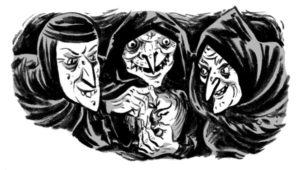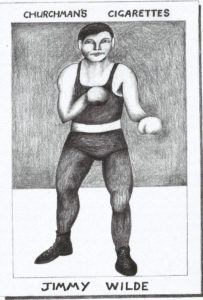One Ghost too Many

This is a true Christmas ghost story from my childhood days.
Which in fact is a tribute to Jimmy Wilde,
the Flyweight Champion of the World,
known as “The Ghost with a Hammer in his Hand”
“Is this a dagger which I see before me,
the handle towards my hand?
Come, let me clutch thee:
I have thee not, and yet I see thee still.”
{Extravagant and prolonged off-stage thunder follows.}
“No, no, no, Church you’re hopeless!” shrilled Miss Powell in exasperation.
“You’ve done your thunder effects at the entrance of the three witches; now go and sit down.”
“But Miss,” I protested, “I think it adds to the d-d-drama.”
“You think, you think!” she exploded, “I think Shakespeare knew how to write Macbeth without your help.”
The cast enjoyed the opportunity to laugh, while smouldering with resentment I put down my large sheet of tin and removed the wicket-keeper’s gloves lent to me by Towser Bailey to protect my hands.
In my eyes, it was yet another instance where teachers would never let you do anything that hadn’t been done before.
I quite liked the slender Morag, Miss Powell, ‘Miss 1485’; I had really wanted to be in the school play, but Miss Powell, witnessing both my stammer and my cavalier improvisation on the text, had reluctantly put me in charge of sound effects.
We called her ‘Miss 1485’ because, as our History teacher, she would stand in front of the class and proclaim in lilting Welsh rhetoric that: “Modern History started in 1485 with the House of Tudor; remember the date, write it in your books, and let it permeate your brain,” her accent tripping over the syllables to give it a lyrical effect. This proclamation was always delivered with a Welsh passion, and by the end of term we had heard it so often that the class could be seen silently mouthing her words in unison.
Over the next three weeks, rehearsals for Macbeth seemed to be coming along quite nicely. I had kept a copy of the play, even though I was no longer involved, but towards the end of Act III, where there is more thunder for the witches, I asked Miss Powell if I could ‘ply my trade.’
“Certainly not Church – enough is enough; you never know when to stop.”
My creativity rejected, I wandered off down to the props cupboard at the end of a darkened corridor. It was there I had what I thought was a brilliant idea. Folded up neatly in the corner of the cupboard was a large white sheet. I opened it out.
From the other end of the corridor I heard Macbeth’s lines,
“… Shall Banquo’s issue reign in this Kingdom?” Morag raised her hands to stop the play and ask: “Where is Banquo’s ghost?”
At this point, no doubt, a picture is emerging in the reader’s mind, and I will therefore fast-forward to the Headmaster’s Study, where, from a cane of my own choosing, “not the flimsy one, Church,” I received three brisk strokes for the disruption of the Drama class. And that, I am sad to say, drew a veil over my theatrical aspirations.
Redirecting my thwarted but relentless enthusiasm, I turned my attention to another form of education – cigarette cards! These were always popular at Goldsworth School, and the game most played entailed flicking the cards between your first and second fingers against a wall about six foot away. The cards stayed on the floor until a player covered one with another card, at which point he picked them all up.
Down one side of the playground there were two large covered alcoves for children to shelter under in bad weather and these made ideal pitches for fag-card contests. Most of the boys held a stock of around 100 cards and some had a few sets, often given to them in albums by their parents.
On one particular play break, during squally conditions, I was engrossed in a game of fag-cards with two other boys – Peter Hapgood and Alfie Parker – otherwise known as the ‘conker kings’. But this being February and with not a conker in sight, they had decided to inject a bit of pace into our sport by lobbing in thruppence a game. As fate would have it, Miss Powell was on playground duty that day, and seeing the three of us settling our bets, came over to investigate.
Now whether Morag was from Chapel stock, I cannot say, but she took a dim view of our sporting activity, equating it to gambling. Calling the three of us together, she asked to see the cigarette cards. Peter and Alfie seemed to have a number of trees and wildlife on their cards, and cheekily, I suggested it helped them with their Nature Study. Unfortunately, mine were predominately jockeys and boxers.
“You’re not going to learn a lot from those Church,” she frowned, and I feared she might confiscate my pack.
“They’re all part of history Miss,” I protested. “Take this one, Jimmy Wilde – World Flyweight Champion – one of the bravest men ever to come out of the Rhondda Valley, and only 7 stone 2 lb.” I prayed that the Welsh connection would get me a reprieve. Surprisingly, she picked up on the history connotation.
“History is it now Church? Well, next History lesson, for the last five minutes only look you, you can give us a talk on Jimmy Wilde – all right? I’ll keep this card of him to remind me to ask you.”

To tell you the truth, all I knew about Jimmy Wilde was written on the back of that card. I now had until Thursday afternoon to get the low-down on him. Perhaps Dad or one of my Uncles could help me?
It turned out that Uncle Arthur – the ex WW1 Sergeant, with bushy eyebrows and a shell-shocked stammer – was best informed. And so with patience, a pen and notepad on my part, and a glass or two of Nan’s Sandiman’s Sherry on his, I learned enough of the man to last five minutes.
To begin with, I was very nervous, but apart from Miss Powell, ‘Miss 1485,’ who had the cigarette card propped up on her desk, no-one else in the class knew much about Wilde. However, they were as usual eager for any diversion, and when my palms stopped sweating, after a while I was able to link up some of the facts and stories surrounding the man. I invited the class to visualise this tiny boxer in singlet and tights, fighting up to 25 bouts a day in fairground boxing booths, eventually to become the Flyweight Champion of the World. Thoroughly warming to my subject, I ended with a spirited demonstration of shadow boxing, telling them that he was known as ‘The Ghost with a Hammer in His Hand’.
“Was he Banquo’s ghost?” chimed in Peter Hapgood.
Laughter and some applause followed, with Morag promptly ending the lesson and giving me back my cigarette card – Number 39 of Churchman’s Boxing Personalities.
Twenty years later, scanning the sports pages one morning before going to work, my eyes were drawn to the heading “Jimmy Wilde – World Flyweight Champion Dies”.
It went on to report that Wilde started out as a coal miner in the Rhondda Valley, but at the age of 16, he began fighting in boxing booths, usually against much heavier opponents. In a professional career spanning 13 years, he won a remarkable 146 of his 149 fights, 99 by knockouts. He died aged 77. This pale and frail looking man concealed so much strength he was known as ‘The Ghost with a Hammer in his Hand’. It all sounded so familiar. There was no picture accompanying the report, but I remembered exactly what he looked like – a ghost from the past.
This story is taken from Michael’s book of short stories, Born To Bet,
available with a few of his other books under Books For Sale.